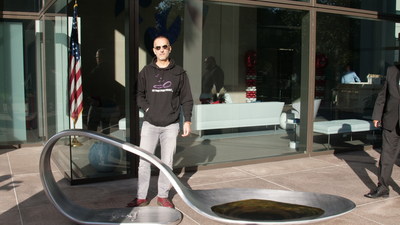With the recent verdict against Johnson & Johnson, whereby Judge Thad Balkman ordered the company to pay Oklahoma $572 Million, ruling that J& J is responsible for fueling Oklahoma’s opioid crisis, this art-activism was designed to inform the public that J&J has played a much larger role in the nation’s on-going opioid epidemic.
|
BOSTON and NEW BRUNSWICK, N.J., Sept. 18, 2019 /PRNewswire/ -- Domenic Esposito, Boston-based artist/activist created a signature 800 lb spoon sculpture depicting a burnt opioid spoon and displayed it at the doorsteps of Johnson & Johnson's (J&J) New Brunswick New Jersey headquarters today to protest the company's role in contributing to the nation's opioid crisis and to further highlight their deceptive practices to the public.
With the recent verdict against Johnson & Johnson, whereby Judge Thad Balkman ordered the company to pay Oklahoma $572 Million, ruling that J& J is responsible for fueling Oklahoma's opioid crisis, this art-activism was designed to inform the public that J&J has played a much larger role in the nation's on-going opioid epidemic. Judge Balkman's financial ruling determined roughly what it will cost the state to run an opioid addiction abatement program for only a single year. The verdict also found J&J guilty of creating a public nuisance, a finding that has much deeper ramification for a company that would have us believe they are only a minor player in production and distribution of opioids. Johnson & Johnson is the world's largest independent biotech company by market cap ($346.1 B), who owns numerous brands including Aveeno, Johnsons Baby and Tylenol, all household names the public has learned to trust because of their "Family" image marketing. While the monetary fine and J&J being found guilty for their role in the opioid epidemic in OK, there were certain "takeaways" worth highlighting as they show, not only the utter deception, but the much larger role J&J played in the opioid influx into the US. The following findings from OK AG, Mike Hunter and his team bear repeating:
Esposito's agenda is clear: "J&J has projected an image as a family company that wants "No more tears" for your children. A company with a corporate credo that boasts "prioritizing customers over stockholders" has done the complete opposite in my opinion. Their credo isn't worth the paper it's written on, or the stone it's carved in. It is my hope that J&J becomes the first to step up to the plate and offer restitution to the opioid stricken communities, viable solutions to restore the lives of those who have been affected by the opioid crisis, admission of guilt and the end of their dangerous, addictive opioid production and distribution," states Esposito. Esposito, founder of The Opioid Spoon Project, a 501 (C)(3)non-profit that focuses on garnering awareness surrounding those that have helped create, profit from and continue to fuel the opioid crisis and seeks culpability, victim restitutions and pro-active solutions to end one of the nation's biggest epidemics to date. Domenic has gained national attention as an advocate for the opioid stricken communities via his signature massive 800 lb opioid spoon sculptures he places at the doorsteps of those he deems to be major contributors to the opioid crisis. To date Esposito has placed spoons at Purdue Pharma in Stamford, Rhodes Pharma in Providence and HHS (to protest the FDA) in the nation's capital. The J&J spoon, like his other spoon sculptures is made of solid aluminum, and includes the J&J moniker engraved on its handle and represents his fourth act of peaceful protest. For additional information, please contact: Cheryl Riley, 202-403-7971, cherylrileypr@comcast.net, www.theopioidspoonproject.com to view the full version on Judge Balkman's ruling: http://fm.cnbc.com/applications/cnbc.com/resources/editorialfiles/2019/8/26/1044673351-20190826-151346-.pdf
SOURCE Domenic Esposito |





